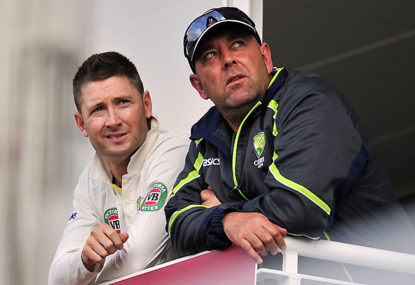MUST WATCH: JFM obliterates IPL bowling attack - even Bumrah! - for 15-ball 50... and keeps going
A six-laden, 27-ball 84 from Jake Fraser-McGurk to continue his outrageous debut IPL!

On the back of Shane Warne’s recent tweets, there’s been some conjecture over how much power a cricket coach should have compared to the captain of the side.
It made me think, why is cricket the only mainstream sport where the captain of the side has more pull than the coach?
The answer is because it’s always been that way and most cricket pundits would like it to stay that way.
Obviously where cricket’s unique to the other sports is that when the game starts all the decisions and tactics are made and played out on the field. The coach on the sideline is unable to make substitutions or draw up plays like in other sports. The captain sets the field and makes bowling changes while the coach watches on.
The role of the Australian cricket captain has always had great prestige attached to it, with people often joking that the role is more important than the role of the prime minister.
But cricket’s changing and so too is its old fashioned traditional views.
Over the years the role of the coach has become more and more important. These days we have batting coaches, bowling coaches and fielding coaches, but it wasn’t until the 1980s when Australia finally employed a full-time coach in Bob Simpson. That, of course, was one of the great turning points in Australian cricket.
So why can’t the coach, for instance, tell the captain when to declare? They already do all the pre-planning and match tactics prior to the start of the match so it’s only natural that they have input as the game progresses.
Of course the captain will always have a major role within a cricketing side. They have to come up with decisions on the fly without being able to consult with the coach. A great tactical captain like Michael Clarke should still have the freedom to go with his gut instincts and make changes on the ground as he sees fit.
That will never change and nor should it.
But wouldn’t a more powerful role for the coach lessen some of the burden attached to the captain’s role? Surely it would, we’ve seen in recent times how much influence a great coach can have over a side.
It wasn’t long ago that Australian cricket was a basket case even under the leadership of Clarke, and it took a strong character like Lehmann to turn it around almost overnight. We’re seeing similar things at Western Australia under Justin Langer and it’s no wonder he’s being touted as the next Australian coach.
Coaches already have more of a say at the selection table with the captain no longer having a vote, and it’s probably only a matter of time before they lose even more power.